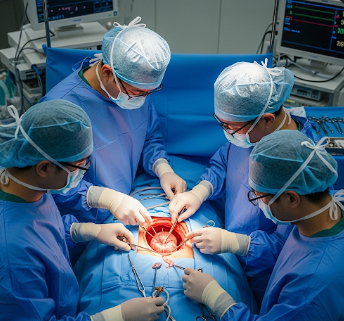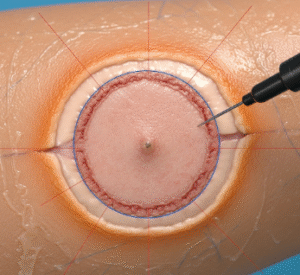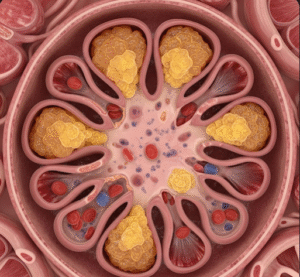Overview
Heart transplant is a life-saving surgical procedure in which a diseased or failing heart is replaced with a healthy donor heart. It is typically performed for patients with end-stage heart failure, severe cardiomyopathy, or congenital heart defects that cannot be managed with medications or other surgeries.
South Korea is recognized for advanced transplant programs, highly skilled cardiothoracic surgeons, and world-class facilities. International patients seek Korea for heart transplantation due to high success rates, rigorous post-operative care, and modern medical technology.
What is a Heart Transplant?
A heart transplant involves:
- Removing a failing or diseased heart
- Implanting a healthy donor heart
- Connecting the major blood vessels and restoring cardiac function
It is generally reserved for patients with severe heart failure unresponsive to conventional treatments. Candidates undergo extensive medical evaluation, including cardiac function tests, blood work, imaging, and assessment of other organ systems to ensure suitability.
What are the Benefits?
- Restoration of normal heart function and improved blood circulation
- Relief from severe symptoms such as fatigue, shortness of breath, and fluid retention
- Extended life expectancy for patients with end-stage heart disease
- Enhanced quality of life → ability to perform daily activities with less limitation
- Access to advanced post-transplant care and immunosuppressive therapy
- High success rates due to Korea’s expertise in heart transplantation
Procedure Details
1) How should I prepare for a Heart Transplant?
- Comprehensive evaluation → Cardiac imaging, echocardiography, coronary angiography, blood tests, and pulmonary function tests
- Medication review → Adjustments to heart medications or anticoagulants
- Lifestyle optimization → Healthy diet, controlled weight, cessation of smoking/alcohol
- Psychological assessment → Evaluate mental readiness for transplant and post-operative compliance
- Waiting list registration → Coordinated with Korea Organ Transplant Network and hospital transplant program
2) What happens during the procedure Heart Transplant?
- Anesthesia → General anesthesia administered by specialized cardiac anesthesiologists
- Surgical steps →
- Midline sternotomy to access the heart
- Removal of the diseased heart while maintaining circulation via heart-lung machine
- Implantation of donor heart and connection of major vessels
- Verification of heart function and hemostasis before closure
- Duration → 4–6 hours on average, depending on complexity
- Monitoring → Continuous ECG and hemodynamic monitoring throughout surgery
3) What happens after a Heart Transplant?
- ICU stay → Typically 5–10 days with intensive cardiac monitoring
- Immunosuppressive therapy → Prevents organ rejection
- Post-op care → Includes infection prevention, wound care, and gradual mobilization
- Follow-up → Lifelong monitoring with echocardiograms, blood tests, and medications
- Lifestyle adjustments → Adherence to medication, regular check-ups, and healthy lifestyle practices
Risks / Benefits
Risks
- ➤ Organ rejection (acute or chronic)
- ➤ Infection due to immunosuppressive therapy
- ➤ Bleeding or clotting complications
- ➤ Arrhythmias or heart rhythm disturbances
- ➤ Surgical complications such as wound infection or graft failure
- ➤ Long-term risks related to immunosuppressive medications
Benefits
- ➤ Life-saving procedure for end-stage heart failure
- ➤ Significant improvement in symptoms and daily function
- ➤ High survival rates in Korea due to advanced surgical and post-op care
- ➤ Restored quality of life and physical activity
- ➤ Access to world-class rehabilitation and follow-up programs
Recovery and Outlook
- ICU and hospital stay → Typically 1–2 weeks for initial recovery
- Gradual return to normal activities → Light activity after discharge, full activity after several months
- Post-transplant medications → Lifelong immunosuppressants to prevent rejection
- Monitoring → Regular echocardiograms, blood tests, and biopsies to detect early rejection
- Long-term prognosis → Excellent when patients adhere to treatment protocols; many live 10–20 years or more post-transplant
- Lifestyle → Healthy diet, exercise, stress management, and avoiding infections
Korean hospitals provide comprehensive post-transplant programs, including patient education, rehabilitation, dietary guidance, and mental health support, ensuring optimal long-term outcomes.
When To Call the Doctor
- ⚠️ Fever, chills, or signs of infection
- ⚠️ Shortness of breath, chest pain, or palpitations
- ⚠️ Swelling in legs or sudden weight gain
- ⚠️ Unusual fatigue or weakness
- ⚠️ Signs of organ rejection (abnormal lab results, decreased exercise tolerance)
- ⚠️ Any complications related to immunosuppressive therapy
Best Korea Option / Process
South Korea is a global leader in heart transplantation due to:
- Highly experienced cardiothoracic surgeons
- Advanced surgical facilities with heart-lung machines and hybrid operating rooms
- Comprehensive immunosuppressive and post-transplant care programs
- Minimally invasive and robotic-assisted techniques for selected patients
- International patient support, including translation, coordination, and follow-up
Top Hospitals for Heart Transplant in Korea:
- Asan Medical Center, Seoul – Largest and most advanced transplant program in Korea
- Samsung Medical Center – Expertise in adult and pediatric heart transplantation
- Seoul National University Hospital (SNUH) – High success rates with advanced post-op care
- Yonsei Severance Hospital – Comprehensive care including immunosuppression and rehabilitation
👉 For patients with end-stage heart failure or severe cardiac disease, Heart Transplant in Korea provides life-saving solutions with world-class outcomes and long-term support.













